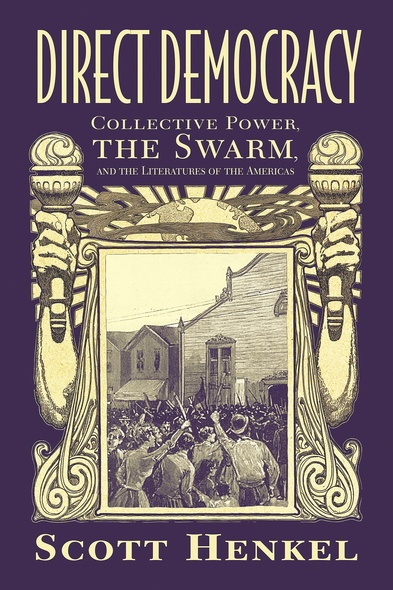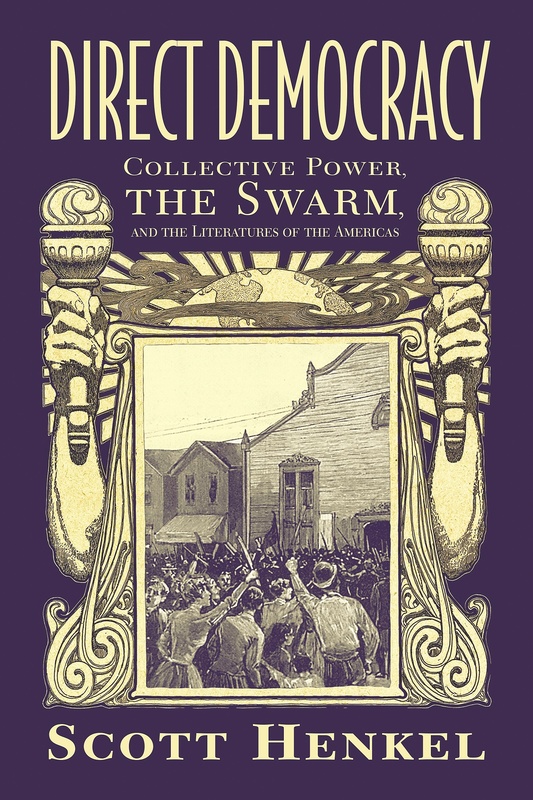
Direct Democracy
Collective Power, the Swarm, and the Literatures of the Americas
Winner of a 2018 C. L. R. James Award for a Published Book for Academic or General Audiences from the Working-Class Studies Association
Beginning with the Haitian Revolution, Scott Henkel lays out a literary history of direct democracy in the Americas. Much research considers direct democracy as a form of organization fit for worker cooperatives or political movements. Henkel reinterprets it as a type of collective power, based on the massive slave revolt in Haiti. In the representations of slaves, women, and workers, Henkel traces a history of power through the literatures of the Americas during the long nineteenth century.
Thinking about democracy as a type of power presents a challenge to common, often bureaucratic and limited interpretations of the term and opens an alternative archive, which Henkel argues includes C. L. R. James’s The Black Jacobins, Walt Whitman’s Democratic Vistas, Lucy Parsons’s speeches advocating for the eight-hour workday, B. Traven’s novels of the Mexican Revolution, and Marie Vieux Chauvet’s novella about Haitian dictatorship.
Henkel asserts that each writer recognized this power and represented its physical manifestation as a swarm. This metaphor bears a complicated history, often describing a group, a movement, or a community. Indeed it conveys multiplicity and complexity, a collective power. This metaphor’s many uses illustrate Henkel’s main concerns, the problems of democracy, slavery, and labor, the dynamics of racial repression and resistance, and the issues of power which run throughout the Americas.
[A]n excellent intervention on behalf of scholars of the revolutionary Atlantic World, one which uses literature to center voices that have been marginalized by traditional scholarship on revolution.
Direct Democracy: Collective Power, the Swarm, and the Literatures of the Americas is provocative and a new catalyst that reminds us there are literatures that motivate movements and communities. They offer models of experimentation and alternative approaches to the injustices and inequalities of the world in which we live.
Direct Democracy does a great service to anarchist politics in several ways. It helps to identify anarchist trends in politics that are easily conflated with archist forms of politics (although Henkel does not employ the language of anarchism and archism per se). By keeping his eye on the subtler forms of direct democracy (what Spinoza calls ‘absolute democracy’) and by refusing attempts to redefine that power out of existence, Henkel helps to identify and promote the anarchist kernel of politics. Furthermore, he helps to ensure that the radical nature of direct democracy is not limited to western models but is also located in radical traditions in African American, Latin American and Caribbean politics and literature.
Inspired by the incomparable C. L. R. James, Scott Henkel explores the ‘swarm' of humanity in the literatures of the Americas, illuminating its deep but often hidden democratizing power to shape the course of history. Here is a timely book for a new age of resistance.
Direct Democracy is an exhilarating investigation of collective political action in the Americas. Marshalling a broad range of theoretical resources, Henkel focuses on the concept of the swarm to construct a protean literary history and theory of collective insurgency since the Haitian Revolution. With elegance and erudition, Direct Democracy argues incisively for a novel conceptualization of collective action, resistance, and direct democracy equal to the challenges of the present age.
In Direct Democracy, Scott Henkel seeks to do nothing less than recover a tradition of direct democracy and collective action inherent in the people of the Americas. This theoretically-sophisticated book contains both strong evidence and a compelling argument that a tradition of direct democracy and collective action has challenged the constraints of power in the past, and will, by implication, do so again in the future.Henkel outlines a new approach to the role and potential of collective action and the concept of power to analyze a variety of intersecting class struggles that have traditionally been viewed within distinct racial and gender boundaries. His interdisciplinary approach combines literary and historical analysis in a way that brings alive the complexity and interconnectedness of a variety of struggles for basic human rights.
Scott Henkel is director of the Wyoming Institute for Humanities Research and associate professor in the Department of English and the Department of African American and Diaspora Studies at the University of Wyoming. His research has appeared in the journals Walt Whitman Quarterly Review; Workplace: A Journal of Academic Labor; and Chiricú Journal: Latina/o Literatures, Arts, and Cultures, as well as the edited volumes Problems of Democracy: Language and Speaking and The Grapes of Wrath: A Reconsideration.




